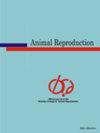新生儿时期人类和狗肠道微生物群的重要性
IF 1.6
4区 农林科学
Q2 AGRICULTURE, DAIRY & ANIMAL SCIENCE
引用次数: 0
摘要
新生儿期是肠道菌群建立和发育的关键阶段,对个体未来的健康轨迹有着深远的影响。本文综述了人类和狗肠道菌群的重要性,旨在阐明这两个物种之间的不同特征和组成差异。在人类中,肠道微生物群有助于几个关键的生理过程,包括消化、营养吸收、免疫系统发育和宿主代谢调节。生态失调是肠道微生物群落的失衡或破坏,与各种疾病有关,如炎症性肠病、肥胖,甚至神经系统疾病。此外,最近的研究揭示了肠脑轴的深远影响,强调肠道微生物群与中枢神经系统之间的双向交流,影响认知功能和心理健康。同样,犬肠道微生物群的改变与胃肠道疾病有关,包括慢性肠病,如炎症性肠病、食物过敏和溃疡性组织细胞性结肠炎。然而,我们对狗肠道微生物群的复杂性和功能意义的理解仍然有限。了解人类和狗肠道微生物群的复杂动态对于制定有效的策略来促进健康和控制疾病至关重要。此外,探索这两个物种之间肠道微生物组成的异同可以促进转化研究,有可能导致创新的治疗干预和策略,以提高人类和狗的福祉。本文章由计算机程序翻译,如有差异,请以英文原文为准。
The importance of the intestinal microbiota in humans and dogs in the neonatal period
The neonatal period represents a critical stage for the establishment and development of the gut microbiota, which profoundly influences the future health trajectory of individuals. This review examines the importance of intestinal microbiota in humans and dogs, aiming to elucidate the distinct characteristics and variations in the composition between these two species. In humans, the intestinal microbiota contributes to several crucial physiological processes, including digestion, nutrient absorption, immune system development, and modulation of host metabolism. Dysbiosis, an imbalance or disruption of the gut microbial community, has been linked to various disorders, such as inflammatory bowel disease, obesity, and even neurological conditions. Furthermore, recent research has unveiled the profound influence of the gut-brain axis, emphasizing the bidirectional communication between the gut microbiota and the central nervous system, impacting cognitive function and mental health. Similarly, alterations in the canine intestinal microbiota have been associated with gastrointestinal disorders, including chronic enteropathy, such as inflammatory bowel disease, food allergies, and ulcerative histiocytic colitis. However, our understanding of the intricacies and functional significance of the intestinal microbiota in dogs remains limited. Understanding the complex dynamics of the intestinal microbiota in both humans and dogs is crucial for devising effective strategies to promote health and manage disease. Moreover, exploring the similarities and differences in the gut microbial composition between these two species can facilitate translational research, potentially leading to innovative therapeutic interventions and strategies to enhance the well-being of both humans and dogs.
求助全文
通过发布文献求助,成功后即可免费获取论文全文。
去求助
来源期刊

Animal Reproduction
AGRICULTURE, DAIRY & ANIMAL SCIENCE-
CiteScore
2.30
自引率
11.80%
发文量
49
审稿时长
70 days
期刊介绍:
Animal Reproduction (AR) publishes original scientific papers and invited literature reviews, in the form of Basic Research, Biotechnology, Applied Research and Review Articles, with the goal of contributing to a better understanding of phenomena related to animal reproduction.
The scope of the journal applies to students, researchers and practitioners in the fields of veterinary, biology and animal science, also being of interest to practitioners of human medicine. Animal Reproduction Journal is the official organ of the Brazilian College of Animal Reproduction in Brazil.
 求助内容:
求助内容: 应助结果提醒方式:
应助结果提醒方式:


